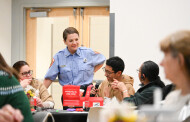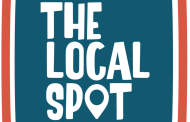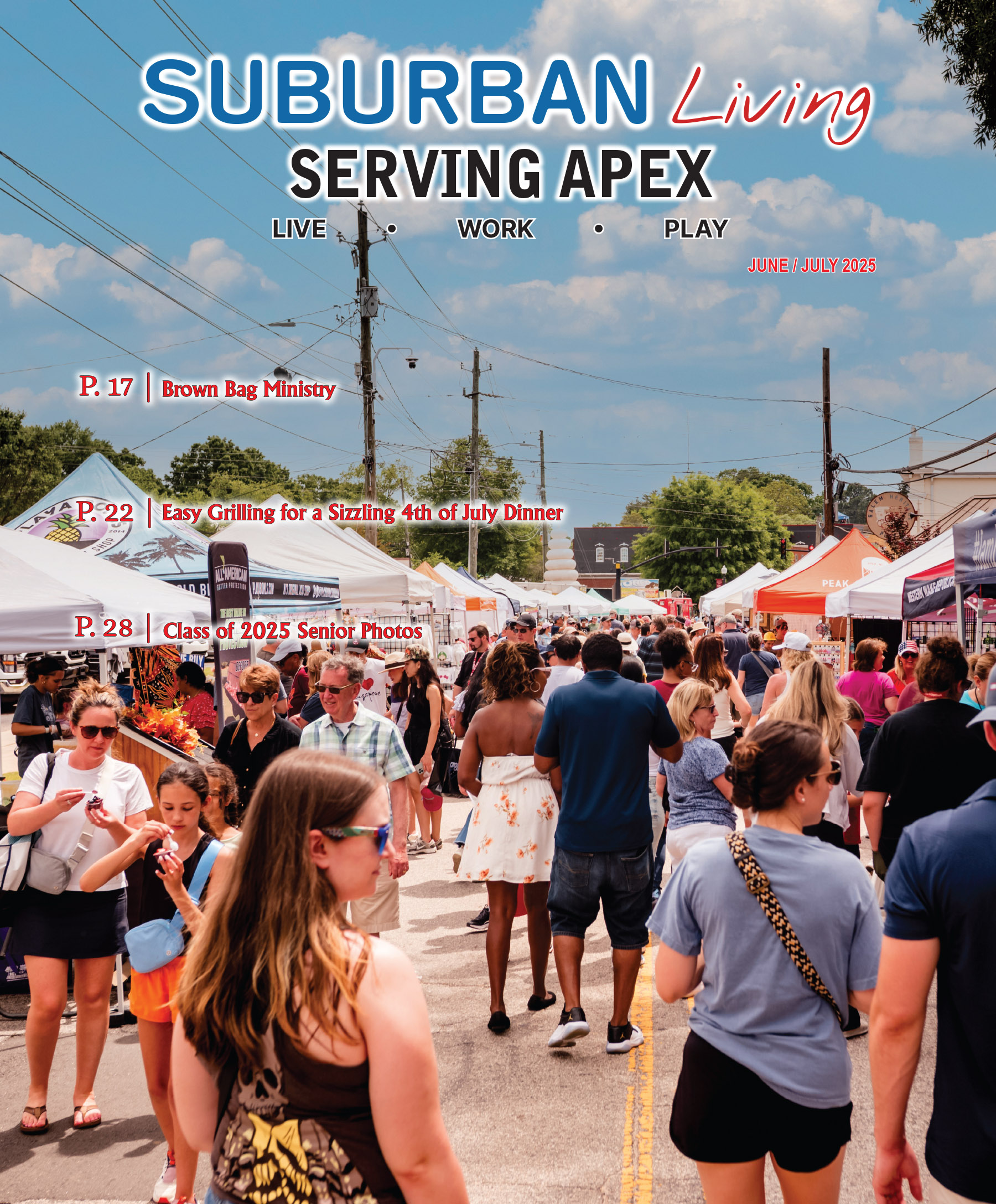What seems basic to some may actually change the lives of others. Some people believe what we don’t know won’t hurt us. But what if what we didn’t know could help us grow? What once seemed normal to Abena Antwi is now something she is on a mission to change because she was open to new opportunities and experiences. By giving of herself with incredible drive, she has already changed the lives of many—and she’s not finished yet!.
Abena was born and raised in Bonwire, a small village in the Ashanti region of Ghana, Africa. Her family immigrated to the United States over the course of 10 years in the late 1980s and early 1990s. Her father came first in 1986, followed by her mother in 1991, then Abena and her middle sister in 1992, and her younger sister in 1995. Although it was difficult to be apart, they followed the proper processes for coming to America and the children stayed with family and friends while awaiting their turn to come over.
Education was deeply ingrained in her by both of her parents, especially with her father being a teacher. After being treated for malaria by the local pharmacist, Abena had her sights set on being a pharmacist herself so that she could help others like she was helped. She earned an undergraduate degree in chemistry from Kean University and a master’s degree in cosmetic chemistry from Fairleigh Dickinson University. It was during her college internship at L’OREAL that she found her love of cosmetic chemistry, a degree she hadn’t known existed. Her reaction was, “Oh wow, I can make my own lipstick, forget the drugs.” She enjoyed her internship so much that she offered to work for free after the internship ended. Instead, they hired her to work part-time.
In 2008, after almost nine years at L’OREAL, Abena joined Burt’s Bees and relocated with her two sons to the Triangle area. She is now proud to call Apex her home. With sixteen years at Burt’s Bees so far, Abena has worked as a scientist and as an external relationship manager as well as in innovation and product design. “Being with Burt’s has been a great opportunity. I love creating,” she says, and she now holds the position of Associate Director-Product Designer. This position has allowed her to travel around the world. The most challenging part of traveling for work is being away from her sons.
Abena has had an entrepreneurial spirit for as long as she can remember. She’s always wanted to start her own company. When she was seven, back in Ghana, she would buy peanuts, boil them, and then sell them out in front of the house during summer break. During COVID, she was inspired by her sister to make and sell a West African dish called Jollof Rice using the tomatoes growing in the garden behind her house. She shared her recipe, but people told her, “When we make it, it doesn’t taste how you make it.”
Her sister suggested that Abena bottle the jollof rice sauce and try selling it. Together, they put the word out on Facebook and within the first week they sold 100 bottles and had orders for more. It took quite a bit of work and research to find all of the things needed, including packaging supplies such as bottles and labels, but the kids helped out.
In an effort to get her product out to the local public, Abena reached out to a wider audience, including local food stores, her neighborhood Facebook page, and the Apex Farmers Market. She offered samples to help boost sales. When the mayor of Apex invited her to the Juneteenth event in Apex, she sold out of everything she brought. After that, she began selling in local Apex venues and doing cooking events on Facebook. By 2021, she was selling at the Holly Springs Farmers Market with such great success that her side business was too big for her home kitchen.
She joined WePower, a local group of women entrepreneurs and partnered with a commercial kitchen in Hillsborough. She also participated in Launch Apex and won a coveted NC IDEA grant to further advance her small business—called Queen’s Jollof Sauces and Seasonings.
“During that time, I was going to Ghana for work,” Abena said. “My job sources shea butter from the northern part of Ghana.” On one trip in April of 2022, Abena took school supplies to give to the students in the village she grew up in. “I remember when I was there, somebody gave me a pencil with an eraser and that impacted me, like it was a Christmas gift.” A trip to a dollar store and the generosity of others filled four suitcases with everything from calculators, pencils, pens, and erasers to sanitary pads and Tylenol.
While in Ghana, Abena spent a week in the Ashanti Region. The school that she had attended was closed for Easter break, but she learned of a new private school that was open in Abira. When she visited the school to deliver the school supplies, she experienced a powerful memory that became the foundation of her new mission.
The school, Serwaa Agyemang Learning Centre, was founded in 2016 with 13 students in a village where school-age children were not attending the local government-run school due to the cost of basic school essentials, classroom overcrowding, and the lack of extra-curricular activities to keep them excited about learning. The owner made sure her school offered activities that prevented children from viewing school as “boring.”
What Abena observed was that the school population—300 pupils and 30 teaching and non-teaching staff—all shared two toilets (pictured below).
“There was a little box and it smelled just like when I was growing up, like pee in a sauna, and it took me right back.” To make matters worse, there is no actual toilet; they just pee in the sand in the boxed area. Growing up, at home, we had one room and we shared toilets with almost 100 people in the household.
“I asked the school mistress if they had a bathroom for going #2. She said they don’t have it here. They have to walk almost half a mile to a public bathroom. They pay to go. After we gave the school supplies to the kids and I was leaving, I asked the lady, ‘What can I do for you?’”
To Abena’s surprise, they were grateful for the school supplies and didn’t have any requests.
Knowing what she knows now made it very difficult for Abena to see and remember what she experienced growing up. Back then, she didn’t know any better. Going back, it felt to her like the school population was not being given what we might see as common dignity.
As Abena was leaving, she looked at the toilet and thought, there is something I can do about it.
There was no time to waste; Abena got to work right away with the women in the village. With fundraising in mind, and experience making crafts since she was little in the village, she worked with the women of the village to create baskets and other crafts from natural resources such as elephant straw. When it was time for her to return to North Carolina, she packed her suitcases with baskets, bracelets, bags/purses, necklaces, table mats, and clothes from the culture. At home, she advertised on Facebook and sold at places like farmers markets in Apex, Holly Springs and Cary, the Raleigh International Festival, and pop-up shops at local churches.
When products sold out, Abena went back to Ghana to get more. She has made two to four trips per year, because it was important to her to go in person to show the people of the village her support and to let them know that she was in this with them.
As a single mom of two boys, with a full-time job that requires to travel around the world, her own business to run (including making her own sauces), and a commitment to connect personally to the people she is helping, people asked, “How do you have time?” Abena’s response was, “That’s the problem, I don’t. I think it’s the drive. It brings joy. It’s not a chore.”
For building the lavatory, Abena didn’t really have a financial goal in mind; it was more a goal of urgency. She wanted enough money to build a bathroom, with actual flushable toilets, for the school. “Every time I sold something, I collected the money and sent it over there and they started building.” The process began in April of 2022. “They dug a well and started building, brick by brick.” They added the pipes, concrete, toilets, and sinks. The children and parents helped in the process. Everything was completed by hand. With about $40,000 US dollars, Abena was able to provide a functioning bathroom with toilets, sinks, and running water. The structure had walls and floors, and a roof was added to the open side of the building. In the school, she added chairs so students didn’t have to share, and they could have their own space to spread out. The work provided jobs for people in the community to build the chairs, put on the roof, and complete the bathroom.
The project was completed in August of 2023 and Abena was invited for the ribbon cutting of the new lavatory. Abena is proudest of being able to give dignity to the students of the Serwaa Agyemang Learning Centre in Abira. “The grand opening was amazing,” she said. “The smiles on the children’s faces…”
Girls, boys, and teachers have their own bathroom area. With the new lavatory, they are able to embrace pride and dignity which brings about new opportunities and experiences. In the past, school leaders were too ashamed to invite people due to the smell from the bathrooms in the front of the school. Now, they have more confidence and freedom to learn from others that come from outside the community. In fact, Ghana Cultural Day of Celebration was hosted at Serwaa Agyemang Learning Centre after the opening of the new lavatory. Prior to the new bathrooms, the owner felt there was no way they could have had the Cultural Day at their school because of the environment and the smell. Now they have a facility they are proud to show off and Cultural Day educates kids about the differences outside of where you live.
Abena isn’t finished yet. Her sauces have won two awards: first place for best condiment for North Carolina specialty foods, and second place for best BBQ sauce for her Queen’s Honey Jerk BBQ Sauce. And she recently received a grant from a small food company based in NC that is going to research to see if she can transition from packaging her sauces in a glass jar to a pouch, which would be great for shipping. She has shipped to Germany, London, and Amsterdam.
On the horizon, Abena wants to start a non-profit organization. Her next project is another lavatory, with accessible sanitary pads, this time at the school she attended in Bonwire, also in the Ashanti Village. “To me, this is not just a bathroom; it’s dignity, especially for girls.”
Putting together her desire to help others and her entrepreneurial spirit, it’s no wonder that Abena’s gifts have come full circle, and she is now able to make a difference in the lives of others in her home village and beyond. There are a lot of opportunities to help Abena, beginning with purchasing her Queen’s Jollof sauces and seasonings . Proceeds from the sales will continue to make an impact, and donations are always accepted and appreciated.
For more information about Abena Antwi, or to give back by purchasing her products, go to her website at www.queensjollofsauce.com/.








